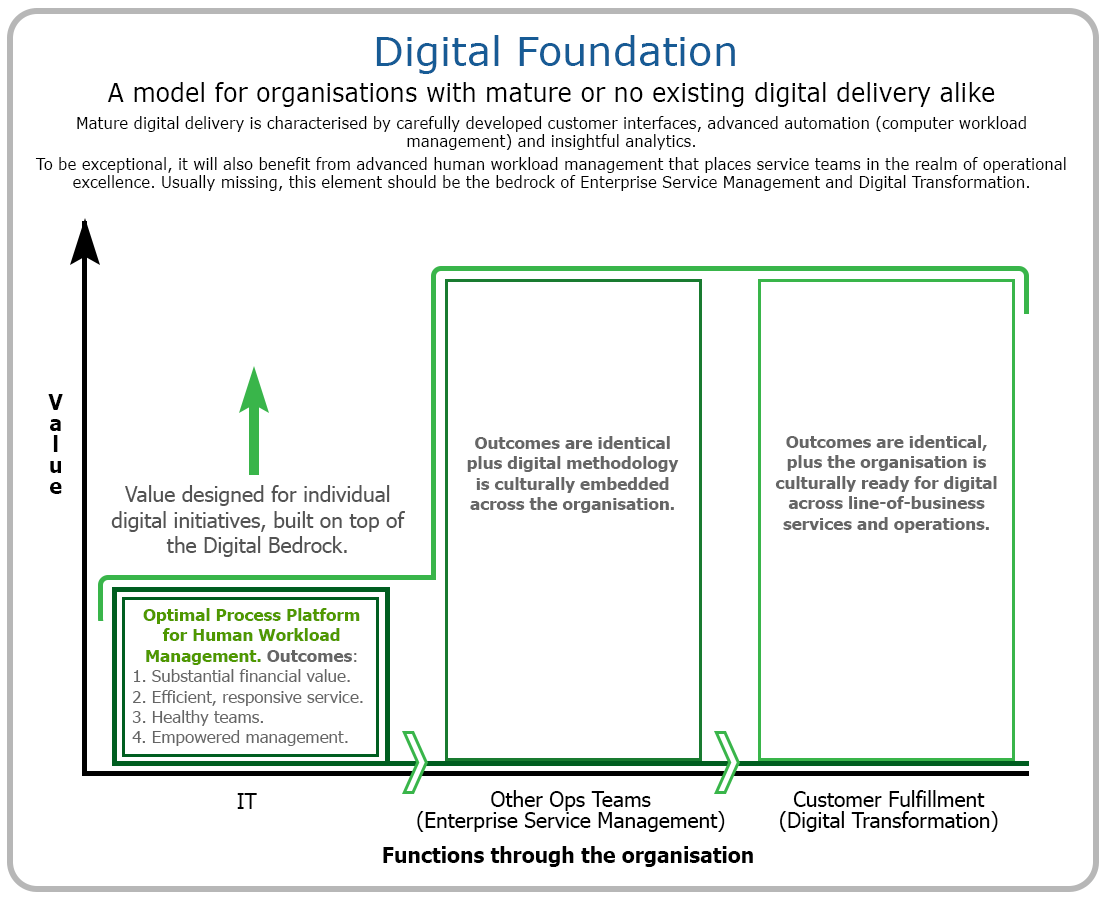December 2018
Maximise Digital Value Creation: and catch 4 other birds with the same stone
If embarking on Digital Transformation that includes Customer Services, or on Enterprise Service Management initiatives, but the quality of your IT support service is less than ideal, you should consider whether you're on the wrong foot to start with.
This is because a vital digital sub-process, human workload management, represented by your IT support service, is sub-optimal and in need of improvement. Once optimised, the process should ensure manual service tasks are always handled efficiently, by empowered teams, something that will benefit IT and other digital services to the extent that it should be their foundation.
Summary:
By developing a lean and efficient human workload management "process platform" within IT, to be rolled-out to other service teams, substantial financial benefits can be expected.
It's a "digital bedrock" that provides financial justification for the replacement of service applications a business might require to enable digital transformation. So, the broader benefits of new digital services and feature-rich service tools can be championed more easily, without it being so necessary to quantify those benefits somehow.
Furthermore, four pivotal business needs are also met by developing the process:
-
IT and other internal services acquire quality and healthy function.
-
Customer Services interactions acquire responsiveness, so your organisation is seen as providing excellent customer support.
-
Benefits from digital ways of operating become felt from within, facilitating the right cultural mindset for your organisation and leaving staff feeling included, not left behind with difficult ways of working while the organisation around them is transformed.
-
Your staff performance review process will be given purpose and value.
Overall, it's a great way for an IT department to add substantial monetary and broad value that's noticed and appreciated across the organisation, supporting strategic business-level initiatives.

IT Support Value Creation:
Monetary value falls into in the following 7 areas.
-
Engaged teams. This is achieved through service structure, empowerment, managerial capability and holistic performance recognition, being the glue that teams need. Happy, stable teams feed stable service, with less time and money spent on recruitment.
-
Gain the most from teams. Engaged, motivated teams produce quantifiably higher levels of work activity. Coupled together with automation, zero admin, enhanced prioritisation, plus the benefits of collective teamwork and cross-functional cover, potential for team size reduction presents itself.
-
Short time-to-fix and high Resolution SLA achievement. Your organisation is supported as well as possible which over time can have a significant upwards impact on corporate and business productivity.
-
Cope more easily when understaffed. This includes sometimes avoiding the need for back-fill contractors when releasing staff to projects.
-
"Manage by exception" with teams on automatic. Efficient support teams function without the need for frequent managerial intervention. Automation and zero admin remove mundane managerial tasks. Smart service monitors proactively identify sub-standard performance if and when it occurs. The result is time created for managers to focus on other things.
-
Healthy staff performance review process. Performance reviews require accurate, fair personal performance metrics. With its resulting information, a review process is beneficial, perhaps for the first time.
-
Faster learning and naturalisation. New support team members settle and contribute faster.
Conclusion:
Year-on-year savings that can be expected are substantial.
Achievement won't be possible unless your ITSM or CRM application is sufficiently feature-rich to support a modern, digitalised way of working - and of course to support digital initiatives more generally. If it isn't, the level of annual savings from optimising service team process will easily justify its replacement. Indeed, this is the case even if only your IT Service Desk team is large enough to fully benefit from a process platform of this kind (three full-time support staff plus a manager).
It might be worth-while putting this in the context of your organisation. Do, or should, your service team managers spend about two hours per day on workload and team activity management? If so, value aspect 5 is relevant. Can you imagine that engaged, motivated teams contributing to workload collectively will see an individual's output increase significantly? If so, value aspect 2 applies.
Financials usually lead decision making but the bigger picture is always more important, that is, how broadly beneficial will the change be. If you can produce truly efficient service teams, both bases - financial and broader - are covered, with benefits growing stronger as digital, including the process platform, is matured strategically through the organisation outwards, starting with IT before infusing internal operations and then out to where it matters the most - in the Digital Transformation of Customer Services.
